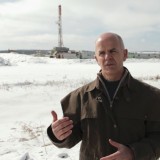British Columbia’s controversial and widely misunderstood carbon tax will soon be subjected to a comprehensive review with the results likely to be revealed in next year’s budget, just in time for the tax to become another pre-election political football to be kicked around by voters and political parties in the run-up to the May 14, 2013 voting day.
B.C. Finance Minister Kevin Falcon announced the move in his 2012-13 budget speech, and a few more details were provided in budget documents, but there are still no details on who will do the review and only a few bits are known about how and when, namely that citizens will have the opportunity to make written submissions to the Minister of Finance and that “changes will be considered as part of the 2013 Budget process” (which usually begins in earnest in the Fall and leads to formal announcements in the February budget). Further details of the review were to be posted on the Ministry’s website: http://www.gov.bc.ca/ca/fin/.
Though that move is thus open to many partisan political manipulations, such as the B.C. Liberal Party potentially trying to use it to portray the B.C. New Democrats as anti-job if they oppose any changes, Falcon made it clear that there also are numerous practical considerations about the carbon tax that need to be reviewed, notably providing some early relief to the export-oriented agriculture and greenhouse industries but possibly including other areas related to air emissions and climate change such as the Pacific Carbon Trust, a Crown corporation seen by many as dysfunctional because it taxes hospitals and schools among other flaws.
The carbon tax is now applied to fossil fuels and other combustibles based on their equivalent carbon dioxide emissions and generates roughly $1 billion a year which is applied to a variety of tax expenditures to make it ostensibly revenue neutral to government. It began on July 1, 2008 at $10 per tonne of carbon dioxide equivalent (CO2e) – i.e. less than a year before the 2009 provincial election that also featured the HST fiasco – and grew by $5 annual increments but will now be capped when it reaches $30 per tonne on July 1, 2012 or about 6.7 cents per litre of gasoline.
“The review will cover all aspects of the carbon tax, including revenue neutrality,” said a discussion paper in the budget documents, which is a reference to the revenues being dedicated to pay for a 5% cut in personal income taxes ($218 million in 2011-12), the low-income climate action tax credit ($188 million), a corporate income tax cut ($381 million), a small business tax cut ($220 million) and several other boutique-type tax cuts and credits needing to be pulled in as the revenues rise (e.g. this year the new childrens’ arts and sports tax credits and the Seniors’ Home Renovation Tax Credit were added).
Curiously the carbon tax expenditures of $1.15 billion in 2011/12 exceeded the revenues of $960 million by $192 million but in years ahead the revenues are expected to grow and exceed the expenditures so new subsidies from the carbon tax are being targeted to science and film incentives to maintain an increasingly-farcical revenue-neutral balance, as Independent MLA Bob Simpson (Cariboo North) pointed out in an interview.
Falcon gave assurances that the government will still “continue moving forward with other components of our Climate Action Plan” such as the LiveSmart home retrofits program, tax incentives for buyers of “clean” or electric cars, and subsidies to help convert heavy-duty vehicle fleets to natural gas, all of which appear to be healthy on-going programs.
However that list of surviving initiatives strangely omitted mention of the government’s also-controversial Pacific Carbon Trust corporation which separately runs a carbon offsets program that public-sector entities are required to participate in and which is seen by Simpson and many other observers as a costly misuse and waste of taxpayer dollars (e.g. taxing school districts and hospitals that are already in financial distress).
“We remain committed to addressing climate change. However, four years in, the revenue-neutral B.C. Carbon Tax remains the only one of its kind in North America,” Falcon said in the Budget speech, noting that the rate increase on July 1 is the last one scheduled which makes now “a good time to pause and examine how the carbon tax is affecting our economic competitiveness.” The budget tax measures legislation includes an amendment to clarify that the carbon tax will continue beyond June 30, 2013 but will be capped at $30 per tonne.
In the budget lockup and subsequent media appearances Falcon reiterated his pride in the government’s leadership on the carbon tax and noted that putting a price on carbon is necessary if you want to address climate change but since no other provinces have followed and the Obama administration has backed off it has become necessary to review B.C.’s plans and probably make some changes, possibly including to the Pacific Carbon Trust.
“Keeping parts of the Pacific Carbon Trust would reinforce our role as leaders on the environment front and I don’t want to give that up,” Falcon said on Vaughn Palmer’s Voice of B.C. show on Shaw TV (viewable online), suggesting changes could be rolled out “in coming months” – but also hinting that Falcon looks upon the whole policy area as a battleground in partisan politics too.
That also hints that a structural change could emerge too in which the carbon tax revenues would be redirected towards Pacific Carbon Trust activities, perhaps replacing the monies now paid in by school districts, health authorities and local governments – even becoming a subsidy for urban transit as Metro Vancouver officials have been recently seeking.
Falcon seemed to avoid such ideas and instead repeatedly focused on the carbon tax impacts on agriculture in general and on greenhouses in particular, noting they will be hit hard when the Harmonized Sales Tax is removed and replaced by the Provincial Sales Tax on April 1 next year so removing the carbon tax would help them survive and remain competitive in export markets, a promise welcomed by Independent MLA Vicki Huntington of Delta South in recent remarks in the Legislature.
Meanwhile Agriculture Minister Don McRae said the government has been working closely with greenhouse operators to create an environment that supports growth and in the weeks ahead will work to that end to provide carbon tax relief.
That precedent of reforming what some have seen as an untouchable sacred cow could help start a number of other carbon and climate policy reforms, many of which will be welcomed by critics such as MLA Simpson and B.C. Conservative Party leader John Cummins and some of which will be regretted by environmental activists, with the B.C. New Democrats so far remaining more or less silent, probably because they suffered in the 2009 election from having a confused policy on the carbon tax.
Cummins stands out by stating that the carbon tax will be the first tax eliminated by a B.C. Conservative government, when he spoke to a post-budget lunch meeting of the Surrey Board of Trade, apparently believing that such a tax cut would create jobs, but his only suggestion so far for replacing the tax revenue has been spending cuts by government, which is nonsensical if one looks at the size of government as a proportion of GDP as was done recently on the Tyee website by pundit Will McMartin, revealing that the Campbell regime has already cut government to the bone.
Nonetheless there is a widespread view especially among fiscal and political conservatives that the carbon tax and its related programs such as the Pacific Carbon Trust have become a confusing mish-mash of contradictory and perverse concepts that kill commerce and services and fail to achieve their supposed goal of combatting global warming or climate change.
When you go online to research the B.C. government’s climate program you find a blinding montage of pretty photos and padded rosters and not many details or numbers until maybe the end of a document if at all. And as Simpson in particular complains, the Pacific Carbon Trust is not open to legislature or public purview even though it is a Crown corporation, the Legislature is exempt and some entities are taxed twice, such as health authorities paying both carbon tax and emissions charges.
That suggests part of the reasons for Falcon’s somewhat unexpected foray into carbon tax and climate policy is to do some political damage control, to make some changes that will mollify such criticisms before they become a political albatross for the Liberals in the 2013 election campaign.
In fact there are still quite a few good things happening in this policy area too, such as energy retrofits of public-sector buildings and private homes, and projects such as the Carbon Offset Aggregation Co-operative of Prince George which on Feb. 24 received $2 million from Environment Minister Terry Lake to help heavy equipment operators and trucking companies retrofit their vehicles’ engines to lower their carbon emissions (though social program advocates could argue that that money would have been better spent on something like addressing child poverty or on home care to help keep seniors out of more costly institutions).
But what you also find, as Simpson pointed out in an interview, is that beneficiaries of such energy-efficiency handouts have an amazingly high rate of also being donors to the B.C. Liberal Party, which ratio he estimated at 95%, and that some of the projects being subsidized might have been done anyway and so should not be considered as incremental for climate purposes.
Simpson interestingly has become such an expert in the whole area that he was singled out for praise by Falcon on the Shaw cable show but that didn’t stop Simpson from calling the Liberals’ various climate programs “bizarre” and “goofy” and “confusing” and “unfair” and even “totally bogus”.
That latter epithet was regarding the government’s initial decision and continuing policy to apply the carbon tax to consumers and public-sector entities but to exempt carbon-intensive industries such as cement plants and natural gas scrubbers, the latter venting methane into the atmosphere comprising about 20% of the province’s total emissions but none of which are subject to a climate tax, and about half of that is now coming from fracked shale gas. Another large source of emissions not being taxed is landfills (i.e. garbage dumps).
B.C. Green Party leader Jane Sterk also drew a connection between climate policy and party politics, surmising that if the government does choose to appoint an outside committee to review the carbon tax (as it has done in other policy areas such as tax reform) then most of the members will be donors to the B.C. Liberals and oriented towards business and industry.
Sterk also shares some skepticism about what the government wants out of the process and what will be done versus what should be done, whether it is to redesign a better carbon tax (which could be done without a review) or merely tweak the system to make it better understood and more acceptable.
“I expect the review will recommend scrapping the tax because other jurisdictions have not followed suit and to rely instead on joining the group of jurisdictions committed to cap and trade,” she said, or it could reduce the tax by half to reflect the reality of it being uncompetitive but still demonstrate some commitment to climate change.
She also predicted the carbon tax will be a key issue in the next election campaign, with the Liberals possibly promising to eliminate the tax if re-elected but also trying to trap the New Democrats similar to what happened in 2009 when the NDP wanted to “axe the tax” but have since swung around to supporting it. However the New Democrats have been silent on the issue of late and did not respond to requests for a comment for this article.
Sterk believes the carbon tax was poorly designed and has become regressive for low-income people and she says the Pacific Carbon Trust needs to be improved but she still wants to retain the carbon tax, hike it to $50 a tonne and keep raising it, and apply it to large emitters while directing some proceeds to transit, rail, biking and pedestrians.
“Our policy on the carbon tax needs to be seen in terms of our overall policy which is to move to regionally self-sufficient and resilient economies,” she said, linking climate change to food security, job creation, health and social and community well-being.
Sierra Club BC executive director George Heyman said the government’s announcement of the carbon tax review sends the wrong signal at a critical time when scientists say we need immediate action to slow global warming.
“Real climate leadership requires long-term commitment, not a one-time gesture,” said Heyman, surmising that the government is definitely looking for a way to get out of the carbon tax either fully or partially.
“This is a government that, at one point, showed leadership on pricing carbon. What they’re saying now is: `We expected everyone to follow us and they didn’t so we’re going to back out of it.’”
Heyman said there should be a systematic expansion of carbon tax coverage to all B.C. sources of carbon emissions but B.C.’s natural gas strategy alone will make it all but impossible to meet the province’s legislated carbon reduction targets, and that the Liberals are not prepared to be honest about the need to develop a low-carbon economy that can assure sustainable, jobs-intensive employment for future generations.
Simpson also believes the government should put a tax on industrial process emissions and with no cap-and-trade on the horizon that the proceeds should go first to Pacific Carbon Trust and then to general revenues, with changes made to PCT, which now gets most of its revenues from the public sector even though it produces less than one per cent of total emissions.
He said the government’s clawback of money given to public agencies such as school and hospital boards is a complete distortion of tax policy and a wrong thing to do when those agencies do not have taxing powers, and that is further distorted because those entities have to pay $25 a tonne for offsets when their market value is only about $4 a tonne.
He noted there are numerous unfair aspects in the system, such as the school districts getting rebates when others don’t, and the health authorities being double-taxed with the carbon tax on the fuels they use and a $25 per tonne charge on emissions.
“To me the issue is we have a finance minister who has never been enamored of the carbon tax … and now is saying enough is enough,” said Simpson, explaining that the Liberal caucus was caught unawares when former premier Gordon Campbell suddenly “got religion” on the need for a carbon tax to address climate change and though the original intent in 2008 was to change behaviours there has been little evidence of that and meanwhile many people in rural areas complain they are being taxed on things they have no choice about.
Simpson said the Liberal government now seems to be after three things, an end to the revenue-neutral nonsense and an easier way to find valid projects to invest in, an end to further increments in the tax, and some relief for sectors being damaged such as agriculture and possibly log truckers.
A roster of the public agencies and what they’re emitting and paying to invest in offsets shows a total of about 800,000 tonnes and offsets worth $18.2 million. It can be viewed in the appendix at:
In any case the carbon tax review could and probably should be seen as an opportunity to make some changes that are progressive and constructive, which is the gist of an op-ed article published Feb. 28 in the Vancouver Sun by Ian Bruce of the David Suzuki Foundation, Matt Horne of the Pembina Institute and Merran Smith of Tides Canada.
After citing international examples of how carbon taxes have stimulated green industries and prosperous economies, they conclude that B.C. also could have a win-win solution for the environment and the economy.
“Communities could see new investment and jobs, a balanced transportation system, reduced traffic congestion, cleaner air, more green spaces, energy savings, and, best of all, a better quality of life. But only if we demand it,” they wrote, urging people to participate in the review proces
—
The following two items are unedited news releases from the stated sources:
PRINCE GEORGE – Environment Minister Terry Lake announced $2 million in funding for the Prince George-based Carbon Offset Aggregation Cooperative (COAC).
This first-of-a-kind program helps heavy equipment operators and trucking companies to lower their carbon emissions.
COAC is a marketing cooperative that provides a framework for owners of heavy equipment and trucks to reduce operating costs and create, aggregate and sell carbon offsets that are produced through a reduction in diesel consumption.
The funding is essential seed money that will help COAC provide more members with low-interest loans to retrofit their heavy duty diesel trucks and equipment to increase fuel efficiency, save money and reduce carbon emissions. Currently, 33 units (trucks and equipment) have been retrofitted. Installation has been completed on the first truck fleet of six units and COAC expects to install another 24 in the near future.
This funding is expected to provide financing to retrofit 100 units per month, resulting in emission reductions of approximately 13,400 tonnes over the first three years. With every 1,000 litres of diesel saved, approximately three tonnes of carbon dioxide will be diverted from the atmosphere. One truck operating for 250 days a year can use up to 300 litres per day and will emit approximately 200 tonnes of carbon annually.
The cooperative provides financing to member businesses for modifications of existing vehicles and machinery that use fossil fuels (diesel). Operators will also receive driver-awareness training that will lead to even more energy efficiencies and GHG reductions that will save them money.
To learn about the first company to participate in the COAC program, visit: http://www.bcjobsplan.ca/ourprogress/b-c-heavy-equipment-company-goes-green/
These reductions in fuel consumption and GHGs emitted will produce carbon offsets, which are then aggregated and sold, transferred or traded by COAC. The proceeds of the sales are returned to the member as a dividend. The offsets are sold as made-in-B.C. greenhouse gas offsets.
This is part of a suite of B.C. Clean Transportation programs and follows on the heels of the Clean Energy Vehicle Program and BC SCRAP-IT funding, which the Province announced in November 2011.
Quotes:
Terry Lake, Minister of Environment:
This co-op demonstrates that being environmentally responsible can save companies money. It also shows how our Climate Action Plan benefits rural communities by helping business owners save money, reduce emissions and participate in a program that benefits B.C. families and helps create jobs.
Shirley Bond, MLA Prince George-Valemount:
This made-in-the-North program will reduce emissions and help heavy-duty vehicle operators increase their fuel efficiency. Congratulations to everyone who worked so hard to create this unique program.
Pat Bell, MLA Prince George-Mackenzie:
COAC is showing some real innovation with this program, and it shows how British Columbia is a leader in developing innovative solutions to lower GHG emissions.
Mary Anne Arcand, COAC chair:
This kind of support from government sends a clear signal that it is serious about addressing climate change, and supportive of industry’s initiative to be innovative and engaged at the ground level.
COAC member representative Doug Pugh:
Having the funding to help smaller operators like me get on the program makes it possible for everybody to do their part in reducing fuel consumption and emissions.
Quick Facts:
- COAC currently represents 25 member companies provincewide.
- Collectively, the companies consume more than 58-million litres of diesel annually.
- The program helps business owners overcome the technological and financial barriers to making carbon-reduction changes to their operations.
- The purpose is to provide a fuel-efficiency and carbon-reduction program for owners of heavy equipment and long- and short-haul trucks to reduce operating costs, aggregate and transfer, trade or sell carbon offsets.
- COAC expects the average savings from these measures to range from 10 to 15 per cent annually.
Learn More:
BC Newsroom – Ministry of Environment: http://www.newsroom.gov.bc.ca/ministries/environment-1/
Carbon Offset Aggregation Cooperative (COAC): www.carbonoffsetcooperative.org
Contact:
Suntanu Dalal
Communications Officer
Ministry of Environment
250 387-9745
—-
Heyman sees budget as threat to water:
Eliminating regulations for B.C.’s expanding mining projects will jeopardize water and wildlife and lead to increased community concern and conflict, Sierra Club BC Executive Director George Heyman warned today following the B.C. budget.
“British Columbians are increasingly concerned about secure access to clean water, but this budget fast-tracks mining projects while cutting regulatory provisions that clearly exist to protect the public interest,” said Heyman. “There is no vision here for a sustainable economy that protects our environmental assets; instead we have more raw resource extraction with reduced public interest protection.”
Government’s public affairs bureau budget – at $26 million – is now three times as big as the budget for B.C.’s environmental assessment office, which has been frozen at $8.75 million despite a significant leap in proposed mining and energy projects.
“There appears to be plenty of money for the government to spin its message, but no increased funding for environmental assessment. New mine proposals around the province, and the environmentally questionable practice of natural gas fracking, cry out for strong measures that guarantee public and community health,” said Heyman.
“The government will spend $24 million in reducing the turnaround time for mineral exploration permits, but not a penny more to ensure robust environmental assessment capacity,” Heyman said. “With the Fish Lake debacle, we saw B.C.’s environmental assessment process green-light a mine that was later scathingly rejected by the federal environment minister. And now the B.C. government wants to make it even easier for mining companies to engage in controversial road-building and drilling that will only lead to community conflict and economic uncertainty around the province.”








 November 15, 2011 – Setting up a road blockade with signs “Road
November 15, 2011 – Setting up a road blockade with signs “Road